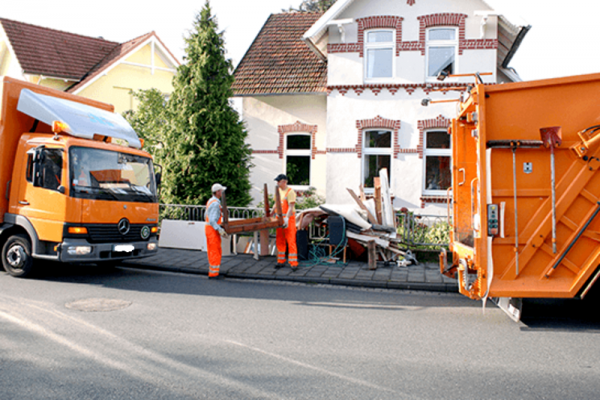Sperrmüll Abholung Berlin is an essential public service that ensures the proper collection and disposal of bulky waste items. From broken furniture to old mattresses and disused household appliances, this service is designed to help residents maintain a clean and clutter-free living environment. Understanding how the process works, the regulations involved, and the various options available can help Berliners make informed decisions about their waste disposal needs.
Understanding the Concept of Sperrmüll
Sperrmüll refers to large household items that are no longer needed and cannot be disposed of through regular household garbage bins. Items like sofas, wardrobes, bed frames, carpets, and washing machines fall into this category. The city provides a structured system for Sperrmüll Abholung Berlin, ensuring that such waste is handled in an environmentally friendly and legally compliant manner.
Who Can Use the Sperrmüll Abholung Berlin Service?
The Sperrmüll Abholung Berlin service is available to all private households in Berlin. Residents can request a pickup through the Berliner Stadtreinigungsbetriebe (BSR), the city’s official waste management authority. This service is meant primarily for residents, not for commercial enterprises or construction companies. Businesses generating large volumes of waste must use specialized disposal services.
Items Accepted and Not Accepted
A crucial aspect of using the Sperrmüll Abholung Berlin service is understanding which items are permitted. Accepted items generally include:
- Beds, mattresses, and bed frames
- Tables, chairs, and sofas
- Cabinets, wardrobes, and shelves
- Carpets, rugs, and linoleum flooring
- Bicycles, suitcases, and large toys
- Household appliances (toasters, microwaves, etc.)
Items not accepted through Sperrmüll services include:
- Construction debris like bricks or plaster
- Car parts and tires
- Hazardous waste (paint, chemicals, batteries)
- Electronic devices such as televisions and computers (these have separate recycling procedures)
- Kitchen and food waste
- Garden refuse and tree branches
How to Schedule a Sperrmüll Pickup
To schedule a Sperrmüll Abholung Berlin, residents need to contact BSR. This can be done via the BSR website or by phone. The process involves:
- Registering a collection request
- Providing a detailed list of items to be disposed of
- Choosing a convenient date for collection
Usually, the waiting time is around two to three weeks depending on the district and demand. Residents should place their items outside on the sidewalk or designated pickup area the evening before collection day, ensuring they do not block roads or pedestrian walkways.
What to Do with Urgent Disposal Needs
In cases where residents need immediate Sperrmüll disposal, BSR also offers an express pickup service for an additional fee. This is especially useful during home renovations, relocations, or when vacating an apartment under short notice. Several private companies in Berlin also offer same-day or next-day Sperrmüll collection services for a premium. However, it is vital to check that these providers are licensed and dispose of waste legally.
Responsible Waste Disposal and Recycling
Sperrmüll Abholung Berlin is more than just throwing items out. Berlin emphasizes sustainability and recycling. Many collected items are sorted and processed in recycling facilities to recover materials like metal, wood, and plastics. Some are also donated or resold if they are in reusable condition. Residents are encouraged to consider donating usable furniture or offering it via local classified sites or sharing platforms before opting for disposal.
Alternative Drop-Off Options
Besides doorstep pickup, BSR provides free drop-off centers where residents can bring their Sperrmüll items. There are several recycling centers (Recyclinghöfe) across the city that accept a variety of bulky waste. This option is often quicker and more flexible for people with access to transportation. Some centers also accept small quantities of electronic waste, paint, and hazardous materials under specific guidelines.
Penalties for Illegal Dumping
Illegal dumping of Sperrmüll is a significant problem in some parts of Berlin. Dumping bulky items on sidewalks or in public areas without a scheduled pickup or proper notification is considered illegal and can result in fines. Surveillance cameras in certain districts and increased patrolling by city authorities have helped reduce this issue, but residents must remain vigilant and responsible.
Sperrmüll Abholung for Tenants and Landlords
For apartment tenants, coordination with landlords or property managers may be required, especially if multiple households contribute to the same collection. In buildings with shared waste areas, it’s common to arrange collective Sperrmüll pick-ups. Landlords may organize this and inform tenants about the collection dates and guidelines. If you’re unsure whether your building offers this service, it’s best to check with your property manager.
Tips for a Hassle-Free Sperrmüll Collection
To ensure a smooth Sperrmüll Abholung Berlin experience, consider the following tips:
- Plan ahead and schedule your pickup in advance
- Make a detailed list of items you want to dispose of
- Ensure items are clean and safe to handle (no sharp or dangerous parts)
- Avoid overloading sidewalks or blocking traffic
- Do not mix general trash or recyclables with Sperrmüll
- Label items if necessary to indicate what should be taken
The Environmental Impact
Berlin is committed to environmental protection and sustainability. The city’s waste management policies promote reuse, upcycling, and recycling. Proper Sperrmüll disposal ensures that bulky waste does not end up polluting the environment. It also supports circular economy initiatives by extending the life of materials through repair and repurposing.
Conclusion
Sperrmüll Abholung Berlin is a crucial public service that plays a key role in keeping the city clean, organized, and environmentally responsible. From scheduling a pickup to understanding what qualifies as Sperrmüll and avoiding illegal dumping, Berliners have access to a well-regulated system that makes bulky waste disposal efficient and sustainable. By following the guidelines, using official channels, and embracing recycling, residents contribute to a greener, cleaner Berlin. Whether you’re clearing out your home, replacing old furniture, or downsizing, knowing the rules of Sperrmüll disposal empowers you to do so responsibly and effectively.
